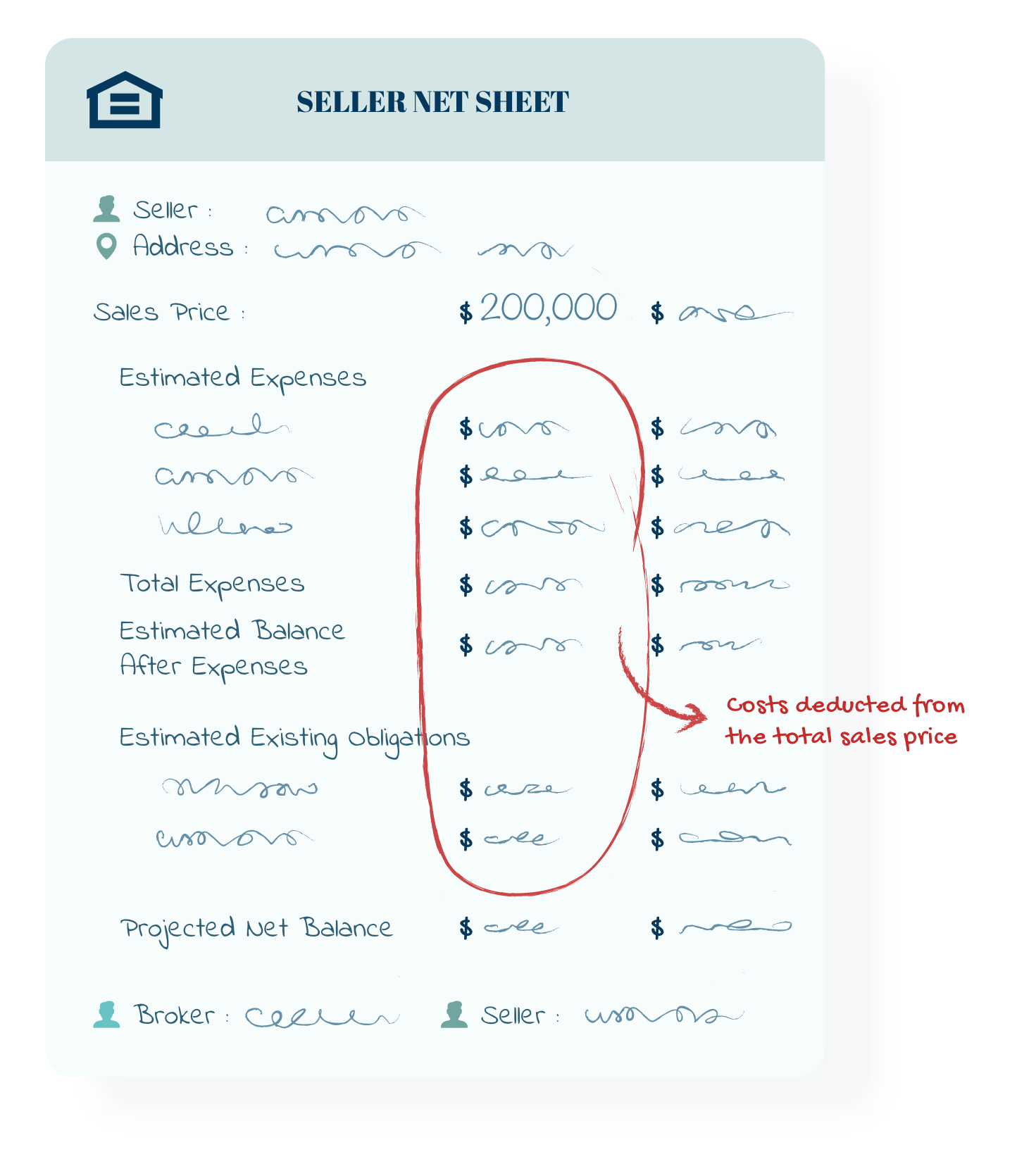Selling your home? Listing one for a potential client? Then you might have come across the seller's net sheet (or a seller net sheet). Read this post to learn about what a seller's net sheet is, why it's important, and how to read one.
It is not uncommon to see home sellers receiving significantly fewer amounts of money after a home is sold compared to what they're expecting. Closing costs and obligations can take a big bite out of sales proceeds. In nearly all situations, the actual sales proceeds from selling a home are always lower than what the seller expects due to closing costs and existing obligations.
The sellers net sheet is a document typically prepared for a home seller that breaks down the sales proceeds, closing costs, and existing obligations during a real estate transaction to calculate exactly what the seller can expect to make on the sale of their home, also called the seller's net proceeds.
In this post, we will explain how you can read a seller's net sheet and various cost components embedded within the document. We will also answer some frequently asked questions about the seller's net sheets.
Psst, if you're in a rush, here's a quick video that breaks down a seller's net sheet for you:
So, without further ado, let’s get started!
What is a Sellers Net Sheet and Why is it Important?
A seller's net sheet shows the total amount a seller can expect to receive by selling their home after deducting the seller's closing costs and existing obligations. The final amount after deducting the closing costs and existing obligations is called the Seller’s Net Proceeds.
Seller's net sheets are important because they provide the seller with exact closings costs and obligations they will need to cover after selling the property. Home sellers typically use this information to better prepare themselves financially after the sale of their home.
In a situation with multiple buyer offers, it is helpful to turn each offer into a seller's net sheet to compare exactly what the seller can expect to make under each offer. This information can then be used to negotiate better terms and increase the amount of the seller's net proceeds.
How to Read the Sellers Net Sheet?
Sellers are typically concerned about their net proceeds which is the final amount they expect to receive after deducting closing costs and existing obligations.
To calculate the seller’s net proceeds all you have to do is to add up all the costs for closing and subtract them from the sales price listed at the top of the sheet.
The seller's net sheet shows a total of 14-15 costs and pretty easy to prepare and read. Let’s go through them one by one.
Estimated Sales Price. The price at which the seller is hoping to list or sell the house. It is the same as listing the price of the property most of the time.
Loan Payoff. The mortgage amount, the seller is yet to pay to the bank or financial institution. If you do not have a loan, you can simply put a zero in that space and move on.
Additionally, you should also make sure to get rid of any lien on the property. If there is a pending lien include that cost in this section.
Attorney Fees. It is the amount paid to the attorney to create the seller's net sheet. Attorney Costs can range from $200-$500.
Grantor's Tax. A form of tax that sellers pay to the respective county during the transfer of the title.
Generally, it varies from 1%-2% of the total sales price of the property. Hence, for an estimated sales price of $200000, you may end up paying $400 as the grantor’s fee.
In many states, you might see “transfer tax” instead of this terminology.
Release Fee. Lenders charge sellers a release fee to recover the legal expenses they paid to generate the title. The release fee could be anywhere between $250-$400.
It is usually charged only when the mortgage is realized by the seller.
Termite Inspection. Cost of inspection for termites. A termite inspection should cost around $70-$100.
Realtor Commission. Realtor commission contributes to a major part of closing costs. Generally, it is 6% of the sales price, 3% for the listing agent, and 3% for the buyer's agent meaning $6000 for a $200000 property for selling.
HOA Fee. HOA fees can vary based on the date the closing occurs and possession of the property. The sellers pay the HOA fees till they live in the property.
For a $200k property, the HOA fees could range from $300-$350 per month.
Home Buyer’s Inspection Repairs. Home buyers may request a home inspection that may reveal the need for repairs. This cost is paid by the seller and should be included in this section.
Appraisal Repairs. Lenders request an appraisal of the property by a professional appraiser. If an appraisal reveals cracked floors, leaky roofs, or anything similar, the sellers pay for the repairs.
Misc. Misc or miscellaneous are expenses incurred when sellers opt for online closing. This could add an extra $30-$40 on the seller’s side.
Septic Inspection.Inspection of the septic system is necessary as it approves the integrity of the septic system. Buyers want to be sure about that as repairing the septic tank could cost them thousands of dollars.
A septic inspection could cost you around $100-$250.
Well Inspection. If the house has a well system it must be inspected to verify that it is free from microbes and other unwanted things. It costs around $300-$400.
Home Warranty. An annual warranty is a contract that covers the cost to repair parts of home appliances and systems. A home warranty may cost around $350-$600 for sellers.
Buyer Closing Cost: In this condition, the seller pays for all the closing costs for the buyer. Thus, the seller receives an amount equal to the listing price of the property.
Now that you know about the costs, where to put them, and how to prepare the seller's net sheet, let’s look into some questions that often pop up in the seller’s mind.
Frequently Asked Questions about Sellers Net Sheets
A few questions commonly emerge when you are dealing with the seller's net sheet. These are:
- Who prepares the Sellers Net Sheet?
- Ideally, the listing agent should give the net sheet to the seller. However, some sellers may prepare it themselves as well. In many cases, the title company or attorney may also provide the document as they are a neutral party for both sides.
- Is the Sellers Net Sheet a legal or required document like the Closing Disclosure?
- No, the seller's net sheet is not a legal document that the listing agent or any other party is obliged to supply. However, a service oriented realtor representing the seller will always work it out for their client to have the right expectations.
- When do you receive the seller's net sheet during the transaction?
- You typically receive a seller's net sheet:
- When you list your property
- When a buyer has expressed interest in buying your property to help you
- When you are ready to close the transaction
- You typically receive a seller's net sheet:
Curious to learn more about seller's net sheets? Read our advanced guide to seller's net sheets in one of our previous posts.







